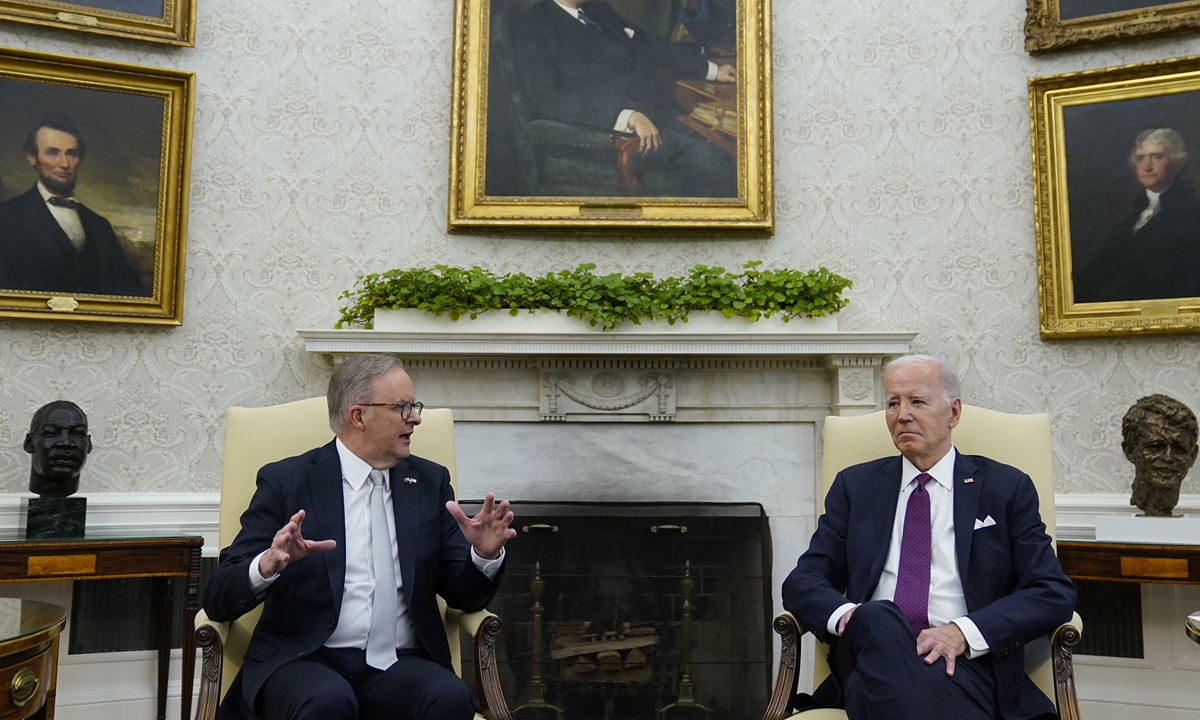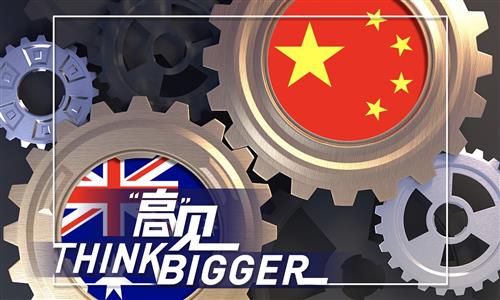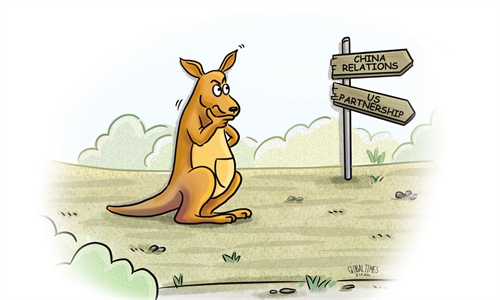Albanese’s US visit ‘awkward, disappointing’; Washington finding it 'hard to collude'

US President Joe Biden meets Australia's Prime Minister Anthony Albanese in the Oval Office of the White House, October 25, 2023, in Washington. Photo: VCG
"It's a state visit of awkwardness and disappointment," a Chinese analyst said of Australian Prime Minister Anthony Albanese's US visit from Monday to Thursday, pointing out that the two allies apparently found it hard to yield substantial results during the trip, although the Biden administration is wooing Canberra to closely follow its strategy to suppress Beijing.
US President Joe Biden sought to prove he can keep the longer-term goal of countering China in his sights as the Israel-Palestine conflict grinds on, hosting the Australian prime minister at the White House for a series of high-level meetings, the Wall Street Journal revealed.
The news report by the US media outlet tries to stress that China-related issues are still on the top of the US' agenda, even as the country is consumed by a crisis in the Middle East, and the Biden administration has given priority to relations with Australia, which is viewed as a linchpin in the US effort to counter China.
However, there was a different feeling in mainstream Australian media, which expressed anxiety over the ambiguous and mixed reactions from the US during Albanese's visit.
Unlike previous boasts of the close alliance between the US and Australia, Australian media outlet ABC News said, "Albanese is walking a diplomatic tightrope between the US and China."
Chen Hong, director of the Australian Studies Centre of East China Normal University, said that Albanese's US trip is awkward and disappointing.
The Australian prime minister was about to deliver a speech in the US Congress, but his visit came just as the House was emerging from its weeks-long internal stalemate. On Thursday morning, a new speaker of the House was finally elected.
ABC News reported that "the US Congress was doing little this week to show its priorities laid with the Indo-Pacific, AUKUS, the Australian prime minister, or anything other than its own infighting."
The absence of a House speaker until Thursday meant an invitation couldn't be issued in time for Albanese to deliver an address to a joint sitting of congress.
AUKUS is the major topic for Albanese during the US trip as the deal has failed to deliver almost anything since its announcement in 2021, making it continue to be an "empty promise," Chen said.
Albanese hopes to crystallize AUKUS and turn it into something substantial, he continued.
However, the deal has long faced resistance within the US Congress as some members argued that the US' military production capacity has reached its limit considering the significant amount of effort, especially on military and defense, the country has put into the Ukraine crisis and the Palestine-Israel conflict. So despite Biden's continuous efforts to promote progress on AUKUS, it raises doubts about whether Australia's needs can still be taken into account in time, according to analysts.
Separately, according to US media, the two leaders made announcements that included an agreement to allow US companies to launch into space from Australia, cooperation on critical minerals and artificial intelligence.
"Critical minerals" is another focus of Albanese's US visit, analysts said.
The concept of critical minerals is a recent development by the US, Chen revealed. He noted that any minerals that contribute to China's economic development and technological progress are considered critical minerals by the US, as it wants to hinder China's peaceful development. The US hopes to woo and pressure its allies and partners together to restrict China's access to such minerals, Chen said.
Australia, on the other hand, has the largest known reserves and production of lithium in the world, most of which is exported to China. Due to economic interests, Australia doesn't really want to fully listen to the US regarding the mineral issue, analysts said.
Given the different calculations and interests between the two allies, it is unlikely the Australian head's US trip will yield substantial results, several analysts believe, who also cited Albanese's upcoming visit to China as another factor.
According to the website of the Prime Minister of Australia, Albanese will become the first Australian prime minister to visit China in seven years when he travels to Beijing and Shanghai on November 4-7.
China welcomes Albanese to visit the country and attend the 6th China International Import Expo (CIIE), Foreign Ministry spokesperson Mao Ning said on Monday.
Chen remarked that Australia has always lacked an independent foreign policy, and the US-Australia alliance is undoubtedly its cornerstone. However, Albanese is seeking to carve out a more independent space for Australia.




